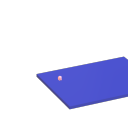@jameslo
https://en.wikipedia.org/wiki/Floating-point_arithmetic#Representable_numbers,_conversion_and_rounding
"[...] Any rational with a denominator that has a prime factor other than 2 will have an infinite binary expansion. This means that numbers that appear to be short and exact when written in decimal format may need to be approximated when converted to binary floating-point. For example, the decimal number 0.1 is not representable in binary floating-point of any finite precision; the exact binary representation would have a "1100" sequence continuing endlessly:
e = −4; s = 1100110011001100110011001100110011...,
where, as previously, s is the significand and e is the exponent.
When rounded to 24 bits this becomes
e = −4; s = 110011001100110011001101,
which is actually 0.100000001490116119384765625 in decimal. [...]"
And as being said here about SC and Arduino, and on the mailling-list on Max or JSON: Pd is not the only user-friendly (scripting/patching) language/environment that had to deal with this.
Althought backward-compabillity is the most precious thing
and long-term maintaince would become more complicated if PD single and double would differ in such an elementary part, my vote goes for more Pd64 developement, if I had a voice.
But for now, it seems like there are several easy experimental improvements, already doable when self-compiling Pd64!?
%.14lg mentioned by @katjav
https://lists.puredata.info/pipermail/pd-list/2012-04/095940.html
or that
http://sourceforge.net/tracker/?func=detail&aid=2952880&group_id=55736&atid=478072
Also we could have a look (for %.14lg  ) in the code of Katja's Pd-double, and Pd-Spagetties is double, too. (dev stopped, I never tried this)
) in the code of Katja's Pd-double, and Pd-Spagetties is double, too. (dev stopped, I never tried this)
@jancsika Is Purr-Data double now? https://forum.pdpatchrepo.info/topic/11494/purr-data-double-precision I don't know if or how they care about printing and saving.


 . I'll take this up on the forums of those other softwares, now with a much stronger understanding.
. I'll take this up on the forums of those other softwares, now with a much stronger understanding.
